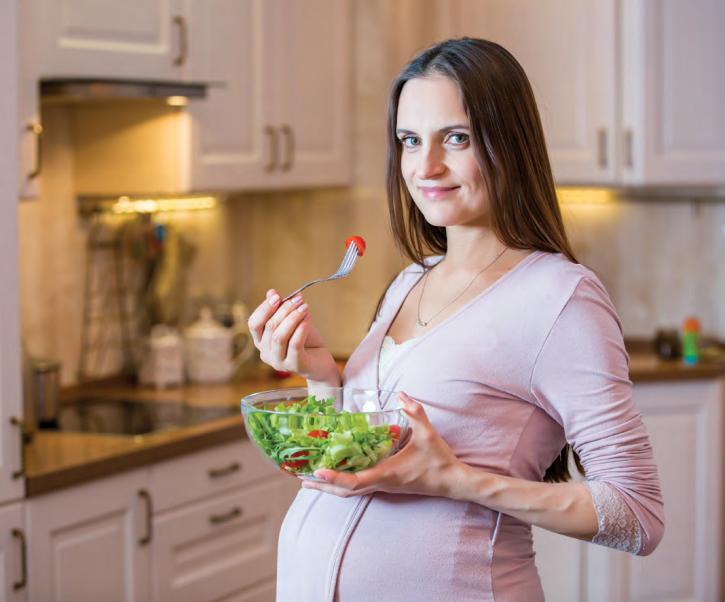Medical Care , Health & Wellness , Women’s Wellness , Diet & Nutrition , Pregnancy
Want a baby? Change your diet.
Ovulation-related infertility can benefit from new “pro-fertility diet”

For those hoping to boost their chances of having a baby, a new diet claims to do just that for women with ovulation problems or disorders. The diet, however, will not help those with blocked fallopian tubes.
Developed by Drs Jorge Chavarro and Walter Willett, both of the Harvard School of Public Health, the diet is based on data from the Nurses’ Health Study, one of the largest and longest-running studies of women’s health in the US.
After reviewing the diets of more than 18,000 women, they found that the quality of their diets improved chances of pregnancy.
The “pro-fertility diet” calls for avoidance of trans fats and sugared sodas, more unsaturated fats, vegetable protein from low-pesticide sources such as asparagus and onions, whole grains, whole milk or full-fat yogurt, multivitamins with folic acid and vitamin B, and iron from natural sources except red meat. It also calls for women to be physically active, exercise daily, and avoid smoking.
Other experts agree the diet could improve fertility for women with ovulatory disorders such as polycystic ovary syndrome, often called PCOS, a condition where women have high levels of male hormones.
Onions might help women with ovulation problems get pregnant
“It’s an overall healthy way of eating and can help women improve their intake of key nutrients for conception and pregnancy,” said Vandana Sheth, a registered dietitian nutritionist and spokeswoman for the Academy of Nutrition and Dietetics, to CNN.
A woman with PCOS can be lean but still be insulin-resistant, which can interfere with ovulation, so the quality of the diet becomes a more important factor, experts say. For these women, eating fewer processed carbs and more whole-grain carbs can result in a slower rise in blood sugar and lower insulin production, which is favorable for fertility.
Asparagus is a low-pesticide source of vegtable protein
The Harvard research reveals that eating more full-fat dairy foods instead of low-fat or fat-free dairy can improve chances of conception among women having trouble ovulating. This is due to the presence of specific hormones in milk fat, but this higher dairy fat intake needs to be offset by cutting fatty foods elsewhere.
In another study published last month and co-authored by Dr Chavarro, the researchers found that a “pro-fertility diet” that included high levels of folic acid, vitamin B12, and vitamin D, as well as dairy, soy, and low-pesticide produce, had a more favorable outcome on fertility when done in conjunction with assisted reproductive technologies compared with the Mediterranean diet.
“The adjusted odds … of implantation, clinical pregnancy, and live birth were higher by 47%, 43%, and 53%, respectively,” wrote the researchers.
“Being overweight or underweight can also affect fertility, as the amount of fat in a woman’s body can influence the menstrual cycle. Overweight or underweight women may have irregular cycles and ovulate less often, thus lowering their chances of conception,” said Dr H Krishna Kumar, a consultant obstetrician and gynaecologist and past president of the Obstetrical & Gynaecological Society of Malaysia, to The Star.
Although such diet strategies can boost your chances of pregnancy, “it’s not an automatic ‘you do this and your live birth rate goes up 10 percent’,” Dr Marie Menke, assistant professor and director of the division of reproductive endocrinology and infertility at UPMC Magee-Womens Hospital in Pittsburgh, told CNN.
One word of caution: if you don’t have an underlying ovulatory disorder, you may not get a lot of added benefit through diet, she said.
Related Articles
Health & Wellness
How to Deal with Obesity & Diabetes?
The prevalence of obesity in the world have continued to increase significantly. It is estimated by WHO that 39% of adults aged 18 years and over were overweight in 2016, and 13% were obese.
Read moreWomen’s Wellness
Breast cancer: will I need to remove my breast?
Dr See Hui Ti from Parkway Cancer Centre addresses a common fear that women have
Read moreMedical Care
Blood delivery drone due to become world’s fastest
New-generation drones slash delivery time of life-saving blood products and medicines in hard-to-reach areas in Rwanda
Read moreLatest Articles
Medical Care
Clinical Exercise Physiologist (CEP): The Emerging of Exercise is Medicine
How Exercising can be a Medicine
Read moreMedical Care
Reversing type 2 Diabetes: Embracing Hope and Determination
Experience the remarkable journey of Ash and his grandfather Atok as they conquer type 2 diabetes through unconventional methods, showcasing the power of love and determination over adversity.
Read moreMedical Care
Bladder Cancer: What You Need to Know
Empower yourself with our comprehensive guide to bladder cancer. Explore symptoms, diagnosis, treatments, and supportive resources to safeguard your health.
Read more